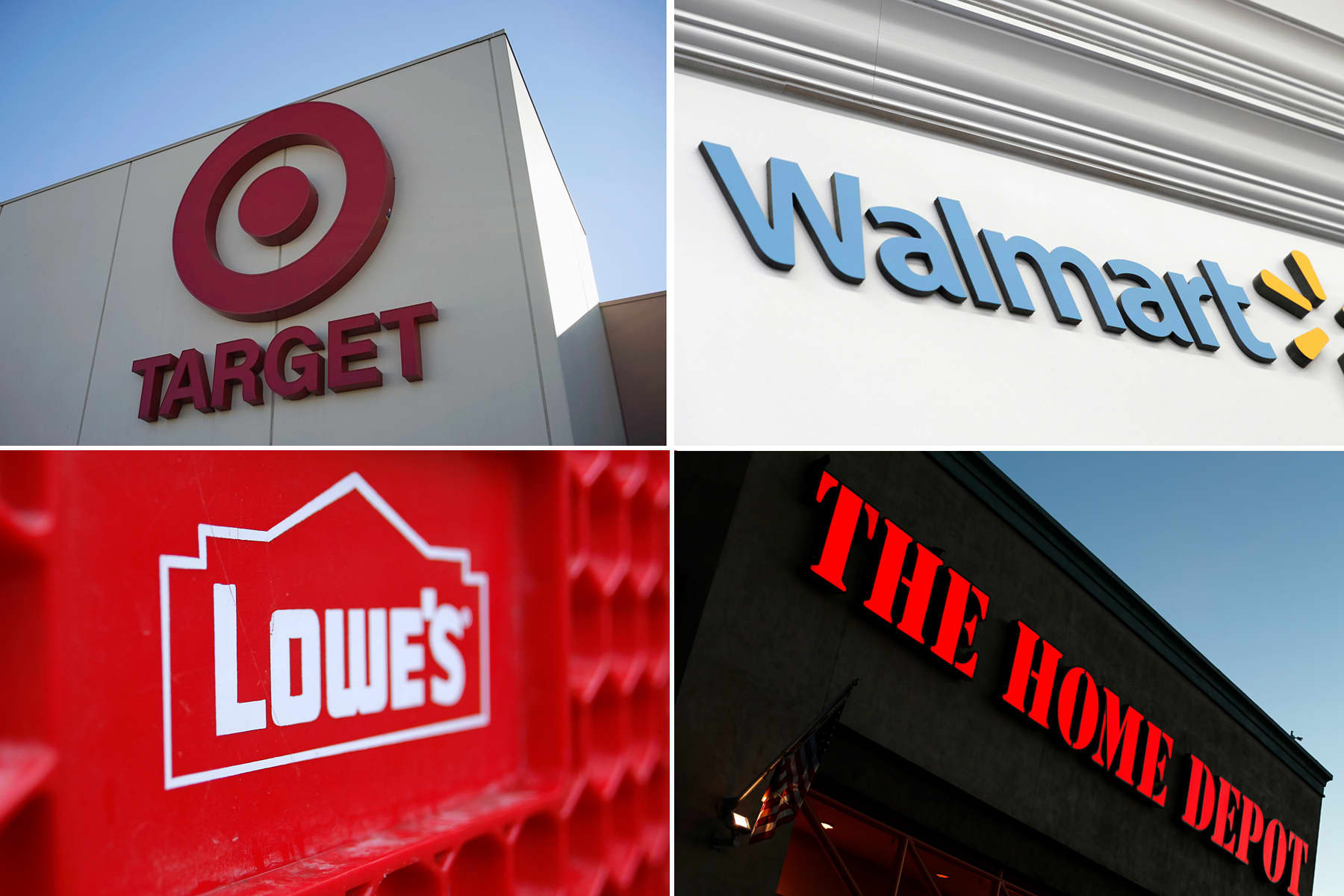[ad_1]
Target and The Home Depot store signage.
Robyn Beck | AFP | Getty Images
Home Depot and Target may sell very different kinds of merchandise. But the home improvement retailer’s slashed forecast could be seen as a warning sign for the cheap chic retailer.
Target will report its fiscal first-quarter earnings on Wednesday, a day after Home Depot posted its worst revenue miss in more than 20 years and lowered its forecast for the year.
related investing news


Here’s a closer look at why Target — and other retailers that report in the coming weeks — may be in an even tougher spot than the home improvement retailer:
Home Depot customers tend to be homeowners.
Home Depot has an edge over many other retailers: Its customers typically own homes. That means they have wealth beyond what’s in their bank account.
On a call with investors on Tuesday, CEO Ted Decker emphasized that difference. He described Home Depot’s shoppers as “one of the best customer sets in any market sector.”
“Our customer is stronger than the overall consumer when you think they tend to have good jobs, increase in wages and own their homes, and collectively those home values have increased by about $15 trillion since 2019,” Decker said, referring to Federal Reserve data.
On the other hand, Target, Walmart and other retailers that report in the coming weeks draw from a more representative pool of Americans. Younger consumers and low- or middle-income families may rent homes and apartments and feel on shakier financial footing than homeowners, particularly as inflation persists and mortgage rates have put buying a home further out of reach for them.
Target sells a lot of discretionary items.
Consumers aren’t going on the big shopping sprees of the pandemic era, as they pay more for food and spend money dining out, traveling or covering the costs of other kinds of services.
The pandemic boom of home purchases and projects could also be to blame, as they don’t need to be repeated frequently, he said.
Yet across the board, consumers have started to make trade-offs. Discretionary spending fell year over year in the U.S., according to data from Circana, a market researcher formerly known as The NPD Group and IRI. In April, discretionary general merchandise dollar sales fell 7% year over year and unit sales dropped 8%, Circana found.
For Target, that’s troubling news. Its sales are driven by many different discretionary categories, including home goods, apparel and electronics. Only 21% of its annual sales come from groceries, compared with nearly 60% of Walmart’s.
Plus, Home Depot has some sector-specific advantages — even as mortgage rates rise — that could insulate it from some of the effects of lower discretionary spending. There’s a shortage of housing in the U.S., and the median year a home was built is 1979, according to the American Community Survey. That means more leaky roofs, broken furnaces and rooms that need a fresh coat of paint.
Plus, as mortgage rates rise, more homeowners are choosing to stay in place rather than sell — a dynamic that’s giving homebuilders more confidence.
On the call with investors, Decker said the retailer ultimately bets on higher demand over the longer term, as more homes “are reaching that 20-year and 40-year sort of witching hour of age” and people put more wear and tear on their homes while working remotely.
Target does not have those factors working in its favor.
Consumers have become more skittish.
Failing banks. Rising interest rates. And tense talks in Washington, D.C., over the debt ceiling.
Consumers are taking cues from economic and political events that have made headlines. In some cases, it has led to more caution.
Home Depot’s McPhail said on an investor call that tighter monetary policy and tighter credit is shaping consumers’ mindsets. In February, he said the company’s business was trending well and if adjusted for seasonal trends it would have translated to positive comparable sales for the rest of the year.
But that changed in March, he said. Not only did unfavorable spring weather hit, but external factors came into play — including the collapse of Silicon Valley Bank.
“We think all of those just build to a broader caution among consumers,” he said.
Consumers who are worried about a shaky economy — or a recession — may be less likely to pick up home decor or clothing at Target.
At Target’s investor meeting in February, the company said it already noticed higher interest rates and inflation pressuring budgets. It gave a conservative outlook, saying it expected comparable sales for the fiscal year to range from a low single-digit decline to a low single-digit increase.
Spring is here. For Target, the holiday season is over.
Home Depot’s busiest sales season is springtime. Do-it-yourself customers and home professionals are more likely to kick off a new project when the weather is sunnier and warm. The shift in seasons also inspires purchases of new plants, landscaping tools and gardening equipment.
That didn’t shape up as the company expected, however. In a call with CNBC, McPhail said Home Depot’s sales got hit by colder and wetter weather in the U.S. West, including California.
Even so, where the weather was good, Home Depot saw a spring lift in categories like live goods and garden-related items, Decker said on the call with investors.
Target’s biggest sales stretch has already come and gone.
The retailer’s fiscal first quarter is after its major November and December holiday season, and before the back-to-school season begins. Sales of its own spring merchandise, such as patio sets and outdoor items, could get hurt by weather too.
One potential silver lining? Target tends to lean into seasonal merchandise, from jelly bean-flavored whipped cream and Easter candy to displays of sparkling wine for Mother’s Day.
[ad_2]

